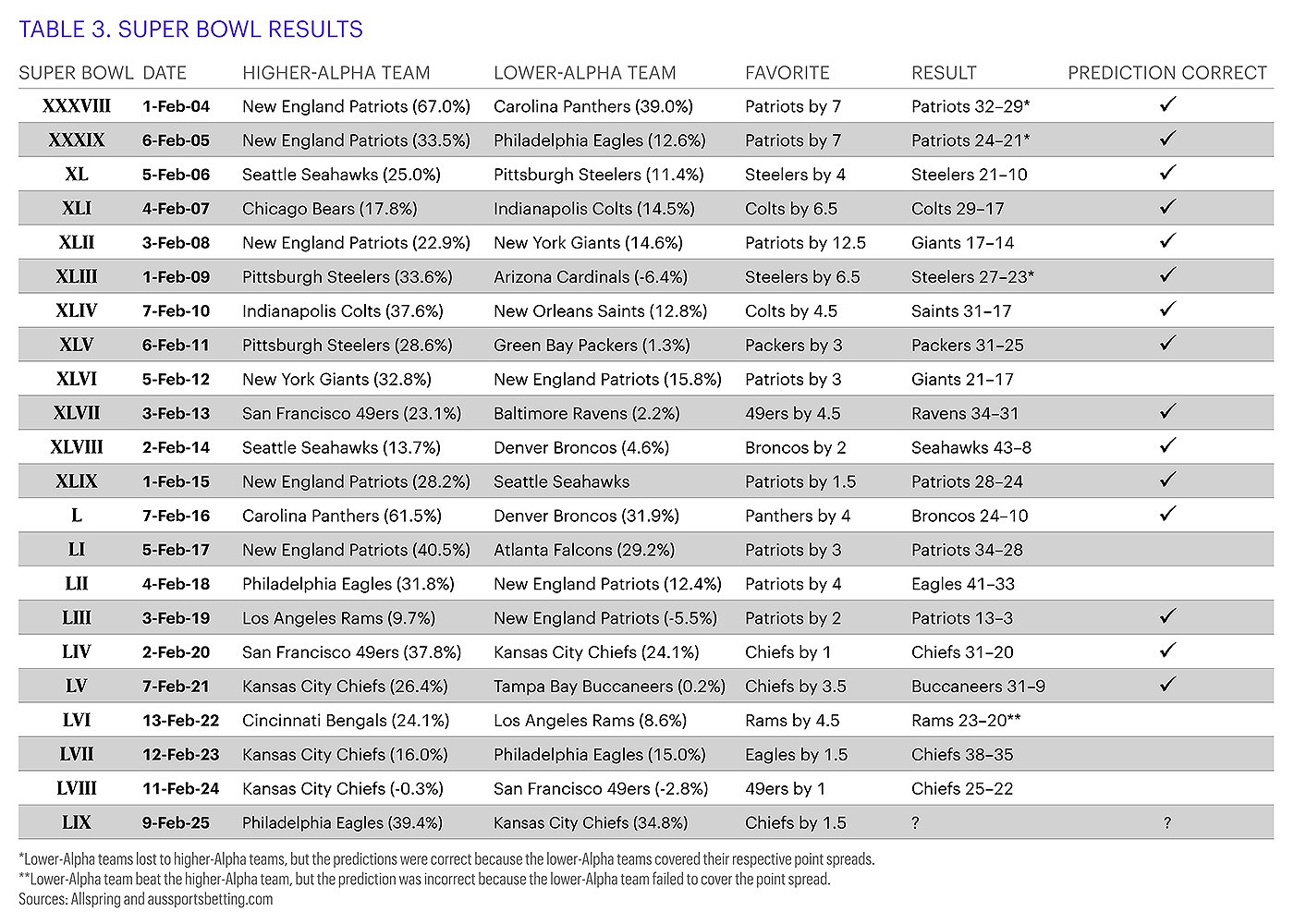NFL Alphas: NOLA Magic
The 2025 Super Bowl game between Kansas City and Philadelphia has the makings to be an all-time classic. Using their NFL Alpha metrics, our Alternative Equity team has picked who they think will win.
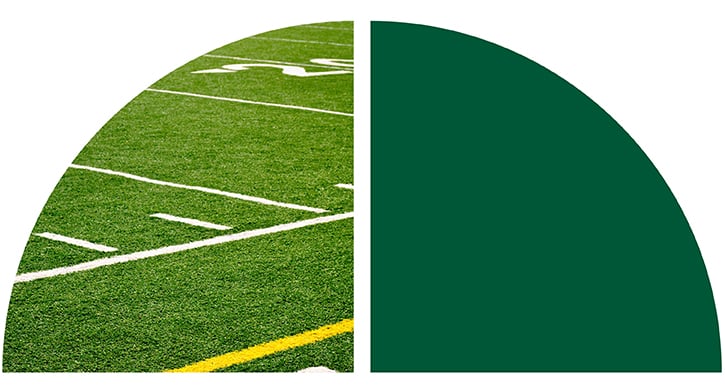
Key takeaways
- Every year, our Alternative Equity team calculates each NFL team’s “NFL Alpha”—a metric that reflects the team’s regular-season results relative to market expectations.
- The betting market expects a tight Super Bowl game, and our NFL Alpha metrics indicate the same.
- Find out whether our NFL Alpha quant model has picked the Kansas City Chiefs for a 3-peat or the Philadelphia Eagles for their first Super Bowl win since 2017.
History repeats itself
“It’s déjá vu all over again.”—Yogi Berra
Patrick Mahomes and the Kansas City Chiefs will meet the Philadelphia Eagles in New Orleans for Super Bowl LIX for a rematch of their epic 2023 Super Bowl LVII matchup. That year, the Chiefs were crowned victorious after Mahomes marched his team down the field for a last-minute, game-winning field goal.
Last year? Different opponent, different city, same story. Mahomes, Travis Kelce, and the Kansas “Swifties” Chiefs cashed in their Super Bowl winning ticket in Las Vegas, capping off a 25-22 overtime victory over the San Francisco 49ers with (what else?) a methodical, game-winning, Mahomes-led drive.
Now before you say this is the same ol’ Mahomes storyline, don’t overlook what the Eagles bring to the table. No, we’re not talking about the “tush push.” We’re talking about the backwards hurdler, Saquon Barkley. After the Giants let Barkley leave a year ago (really, New York?), all he did was rush for a league-leading 2,005 yards, bring “M-V-P” chants to Philadelphia, and lead the Eagles to a 14-3 record.
This year’s Super Bowl has the makings to be an all-time classic, and Vegas seems to think it will come down to the wire. Good news for the Chiefs, as they’ve won an NFL-record 17 consecutive games decided by 7 points or less, including 12 such wins this season (another record). That’s a lot of momentum, but let’s see if our quant model picks the Chiefs to complete their quest for the first 3-peat in Super Bowl history or if it picks the Eagles to capture their first Super Bowl win since 2017.
Bear down
Every year, we look at the outcome of every NFL game and pretend quantitative investors know a thing or two about sports. We’re quants, so of course we need a metric to objectively evaluate each of the 32 teams’ performances during the regular season. We call it “NFL Alpha.” Each team’s NFL Alpha (Table 1) is structurally similar to the alpha an investor computes for a security: It represents an asset’s (a team’s) performance relative to market expectations.
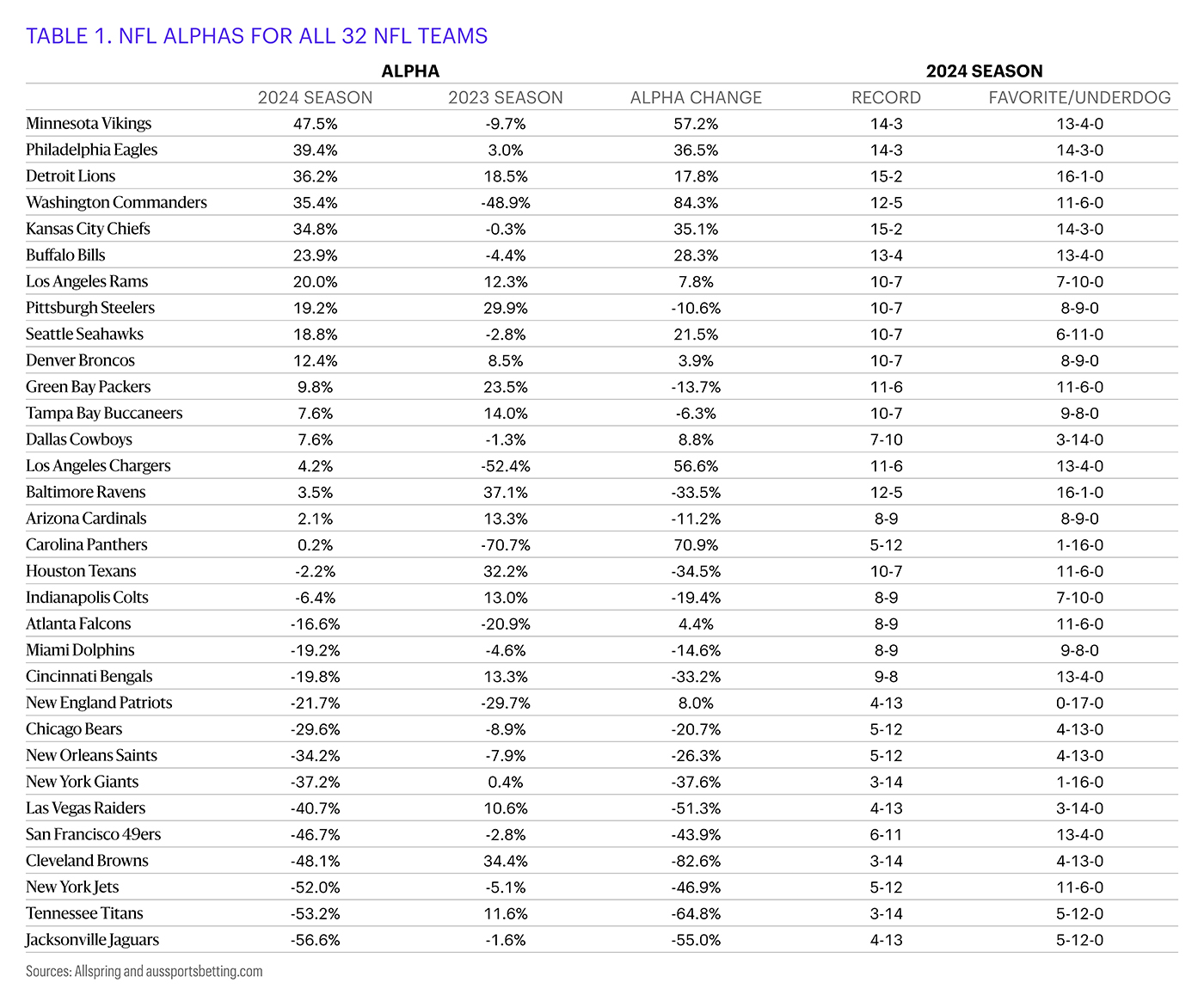
To help illuminate this concept, let’s take a trip to the Windy City and review the Chicago Bears’ turbulent season through the NFL Alpha lens. For each of the Bears’ 17 games, a bettor (unfortunately and, of course, hypothetically) put $100 on the Bears “money line” to win the game. For each of the 13 games the Bears lost, the bettor lost $100. This included the Bears’ infamous Week 8 loss to the Washington Commanders on a last-second Hail Mary thrown by Commanders quarterback Jayden Daniels (whom the Bears had passed over with their first pick in the 2024 NFL draft) while a Bears defensive player was prematurely celebrating a victory that wasn’t.
On the bright side, for each of the four games the Bears managed to win, the bettor received $100 plus an additional sum determined by the market-implied likelihood that the lowly Bears would win the game.
When the Bears’ regular season ends, the bettor totals up the money he received as a reward for the four winning $100 bets and compares it with the $1,700 he risked over the season. Anything more than $1,700 in earnings would imply a positive NFL Alpha, and anything less than $1,700 would result in a negative NFL Alpha. Since the Bears were bad in 2024, the team’s low likelihood of winning meant the bettor received a handsome sum for each win. Despite those high payouts, the Bears’ low win number couldn’t overcome all the losses. In the end, the bettor received $1,197—29.6% less than he wagered. Thus, the Bears had a -29.6% 2024 NFL Alpha. Bears fans, we’re done. We promise!
Sophomore slump, or better with age?
To further illustrate market expectations’ impact on a bettor’s outcome, let’s compare the bettor’s outcomes for the Houston Texans and LA Rams. Both teams ended the regular season with identical 10-7 records but dramatically different NFL Alphas. At the season’s outset, bettors felt the Texans were primed to take another step forward after second-year quarterback C.J. Stroud led them to a surprising division title and first-round playoff win in 2023—his rookie season. However, while the Texans won a respectable 10 games en route to the AFC South title, that division was the worst in the NFL, rendering those results slightly worse than market expectations, for a -2.2% NFL Alpha.
Meanwhile, although the Rams had a solid 2023, their future Hall of Fame defensive tackle Aaron Donald retired, their quarterback was 36 years old, and they had numerous high-profile injuries. So, the Rams were favored to win just 6 of their 17 games in 2024. That backdrop increased the value of their wins, making their 10 wins worth an NFL Alpha of 20.0%.
In football betting, like the markets, expectations matter.
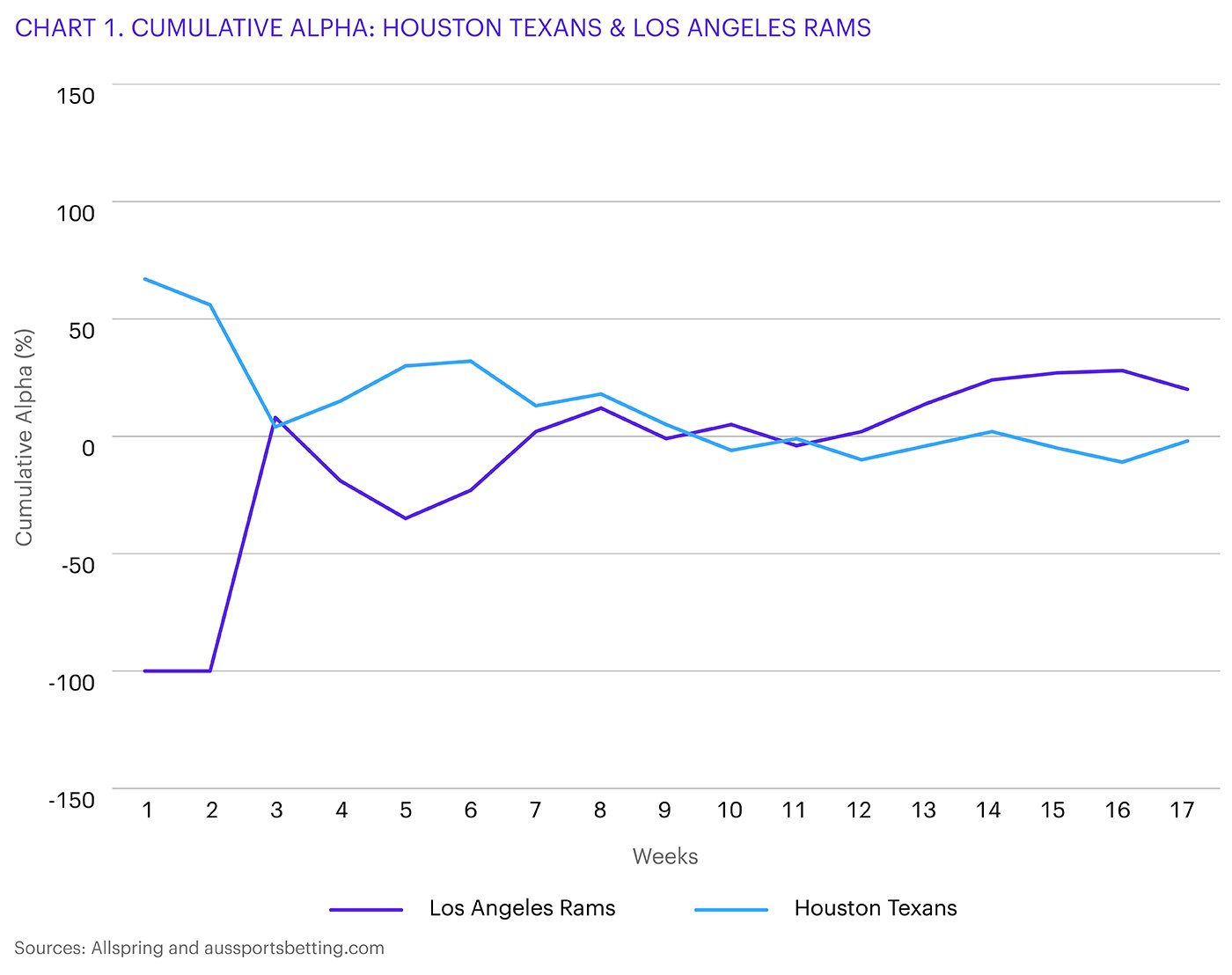
Favorites are underrated
2024’s NFL season was dominated by heavy/moderately heavy favorites. This is consistent with most years on record: Bettors tend to overpay for “lottery tickets” (long-odds underdogs with large payouts) at the expense of solid-but-unspectacular weekly payouts for favorites.
This bias isn’t unique to football. The low-beta anomaly exists across global financial markets and is a pattern that Allspring’s Alternative Equity team has taken advantage of for over 20 years. We seek to benefit from lower-risk (lower-beta) stocks outperforming their higher-risk counterparts over the long term.
In Chart 2, the 2024 NFL season’s results illustrate the possible long-term benefits of repeatedly betting on the most consistent outcomes—and more significantly, the potential downside of betting on the least consistent outcomes. In 2024, bettors who placed a $100 money line bet on each favorite of greater than 9.5 points earned +8.6%, while those who bet on all favorites between 4 and 9.5 points earned +12.4%. Meanwhile, a bettor who placed a $100 money line bet on every underdog of greater than 9.5 points lost more than half of his capital (-54.1%). Ouch!
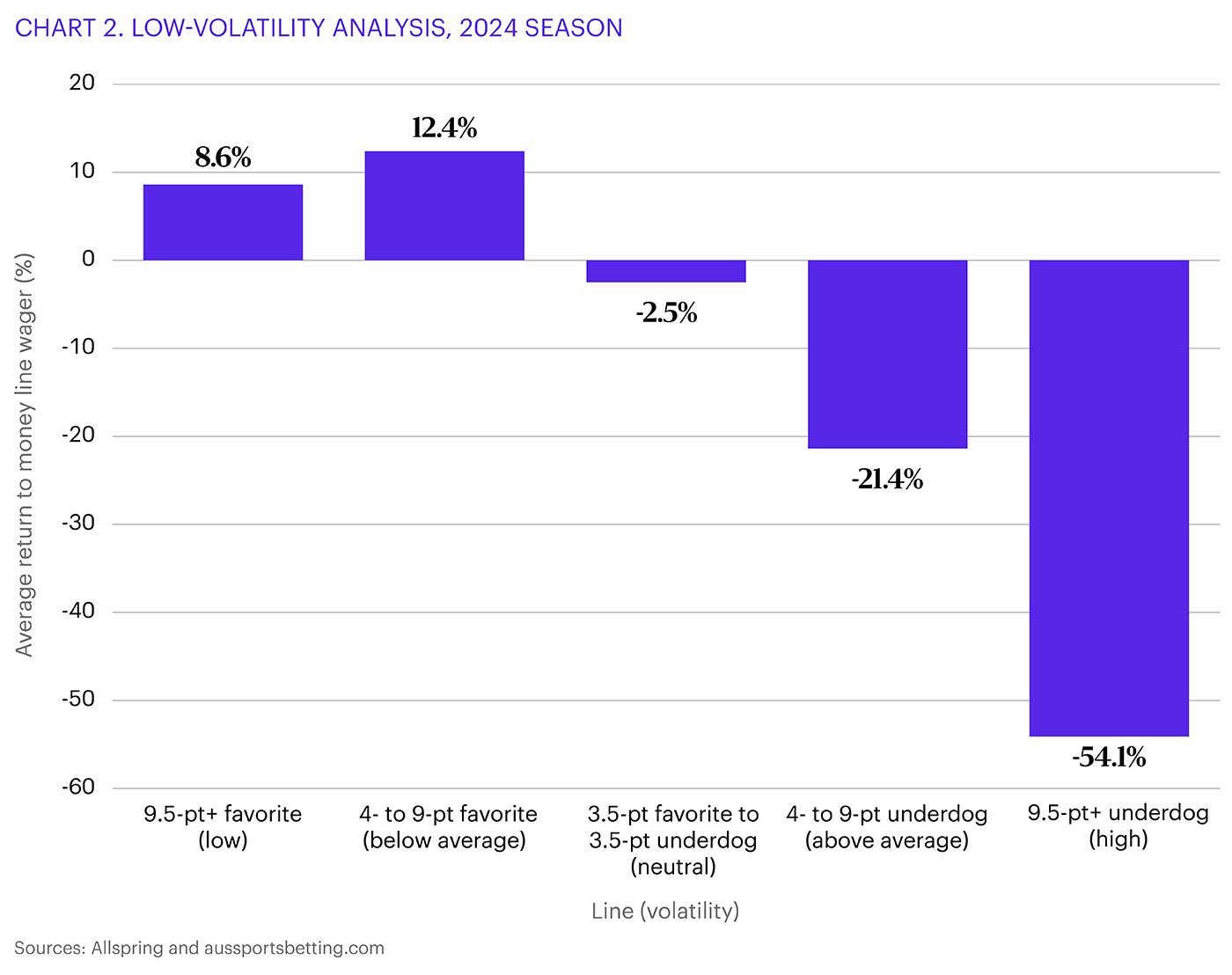
Postseason expectations
In our experience as quant investors, we often observe prices, factors, and returns that revert toward historical averages or trends over future periods.
In NFL betting markets, we see a similar phenomenon: Among postseason matchups, teams that outperformed their regular-season expectations by a smaller margin (the ones with lower NFL Alphas) have been more likely to cover their point spreads. In other words, bettors tend to overvalue teams that outperformed during the regular season (and vice versa), so the postseason bettor gains an edge by betting on the lower–NFL Alpha team to cover the point spread. If we consider this approach to be dictated solely by the direction of the spread and not by its magnitude (in other words, by which team’s NFL Alpha is lower, with no attention paid to by how much), the approach has a 141-99 record (59% win percentage) across all postseason games since we started writing about NFL Alpha in 2004.
What’s also interesting to note, though, is that when the magnitude of alpha difference (high-low) is considered over the same set of games, the lower-alpha team covered in 53.4% of games when the difference was 15% or less, 60.8% of games when it was between 15 and 30%, and 65.5% when it was 30% lower. More alpha difference, more edge.
Leading up to 2025’s Super Bowl, though, the directional approach is a modest 6-6 (a Super Bowl win would surely help revert the trend toward the long-term win rate!). Table 2 shows our NFL Alpha–based 2024 playoff predictions and results.
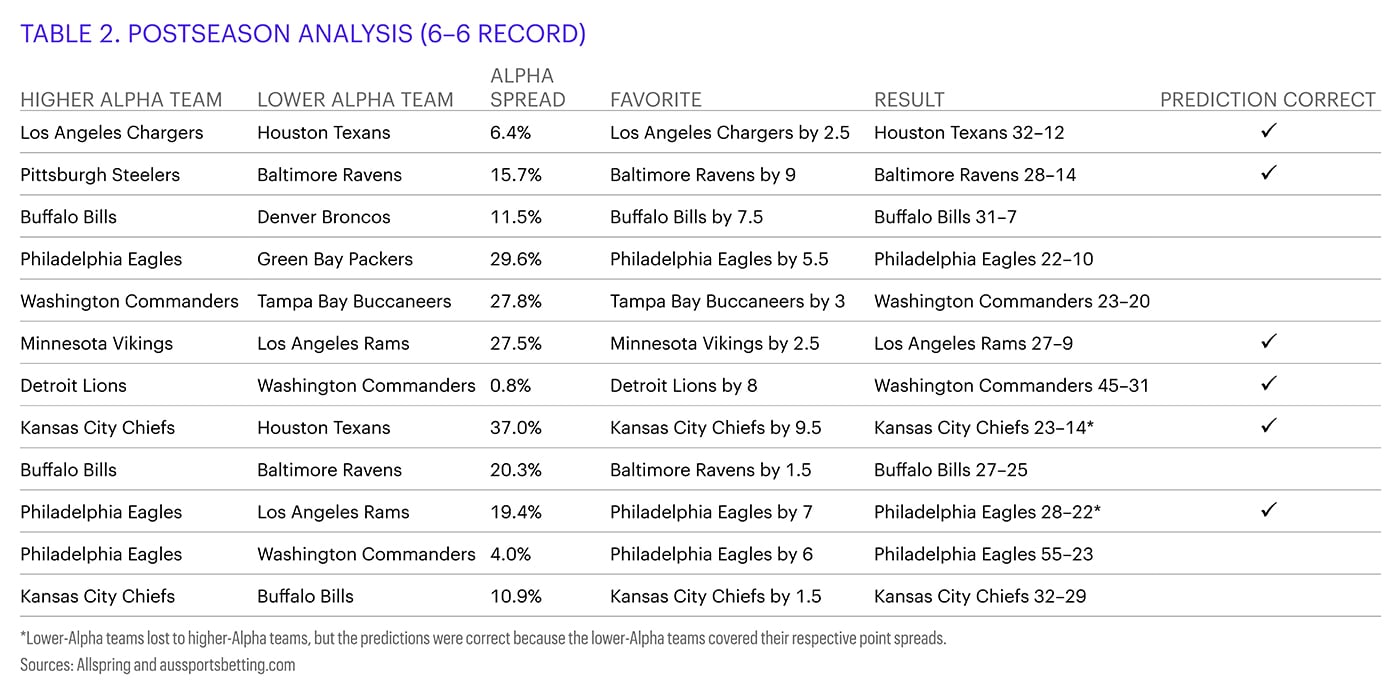
3-peat inbound
Just pick already!
Let’s go, Chiefs! We’ll be rooting hard for the 3-peat, but for the third consecutive year, we must admit the model’s Super Bowl pick doesn’t have a ton of “oomph” behind it. The betting market is expecting a tight game with the Chiefs a 1.5-point favorite, and we agree. The Eagles’ NFL Alpha (39.5%) is slightly higher than the Chiefs’ (34.8%) for a spread of 4.7%. The system wins enough in this range to make the wager—we just ask that you don’t blow all your Mardi Gras beads on it! As tight as it is, 4.7% is actually a larger spread than either of the Chiefs’ two previous Super Bowl victories (1% and 2.5% in 2023 and 2024, respectively). So, we’ve got that going for us!
Could Saquon and the Eagles (literally) run away with it early in the game? Sure, but give us Mahomes with the ball, down by less than one score inside the two-minute warning, and we’ll like our chances—he’s an astounding 7-for-7 in such situations across his postseason career!
